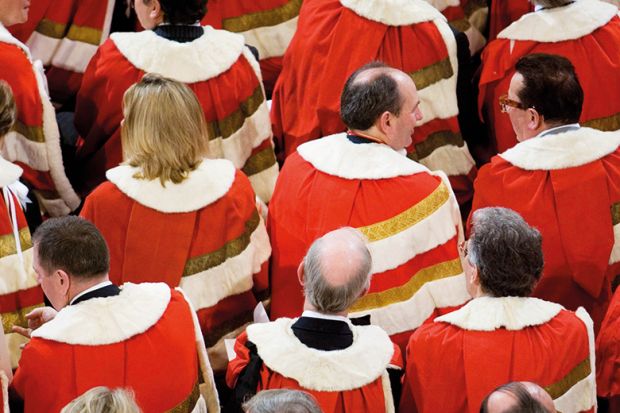The UK government has suffered a surprise defeat in the House of Lords over its plans to link English universities’ performance in the teaching excellence framework (TEF) to the tuition fees that they are allowed to charge.
Peers backed by 263 to 211 an amendment that says that the results of the TEF should not be used to determine the fees that an institution can charge, or the number of students – domestic or international – that they can recruit.
The amendment to the Higher Education and Research Bill was proposed by crossbencher Lord Kerslake, Labour’s Lord Stevenson of Balmacara and Liberal Democrat Baroness Garden of Frognal.
The vote is a significant blow for Jo Johnson, the universities minister, coming after he unveiled a host of amendments to the legislation in the hope of steering it through the upper house.
The government now has the choice of accepting the amendment, or bidding to force through its proposals with the backing of MPs.
A second defeat was inflicted on the government when peers backed an amendment that would require higher education providers to offer students the opportunity to be added to the electoral roll locally.
Nick Hillman, director of the Higher Education Policy Institute, described the fees vote as “significant”.
“It could damage the TEF if it were allowed to stand and it goes right to the heart of the things Jo Johnson cares about,” he said. “So it is different to much of the furore on the bill to date.
“Universities will be worried about the threats to their income but much of the student movement will be celebrating – at least until the MPs reverse the vote.”
Under the government’s plans, universities that are rated “gold” or “silver” in the TEF will be able to raise their fees in line with inflation from 2019 onwards. Institutions that score “bronze” will be eligible for only half of that rise.
Assessments of providers based on their performance on student satisfaction, retention and graduate employment, as well as further submissions, are under way.
But student groups had warned that linking the TEF to fees would disadvantage poorer students and punish institutions that perhaps need additional funding the most.
Sorana Vieru, vice-president (higher education) of the National Union of Students, hailed the fees amendment as a “major win for students and for the NUS”, if it could be held on to.
“It’s a concession that can be taken back when the vote moves back to the House of Commons in about a month’s time,” Ms Vieru wrote on Facebook. “It’s a concession we are going to have to fight to keep.”
A Department for Education spokeswoman said: "The fee cap set in 2012 ensured our universities were sustainably financed, allowing us to lift the student number cap. Our proposals do not raise the fee cap in real terms but simply allow it to keep in line with inflation.
“At the same time, they will drive value for money, because for institutions to charge the cap, they will have to demonstrate they are delivering high quality teaching. We believe universities must do more to demonstrate the real and lasting value they deliver for students.
"Those opposing the link between TEF and fees will have to explain how they will maintain the financial sustainability of our universities while ensuring students can be confident of a high quality education."
Lords defeat: Twitter reaction
National Union of Students
We asked 4 the link between the TEF & tuition fees to be cut. Tonight, the Lords have passed an amendment DOING JUST THAT!!!#TEFOff #HEBill pic.twitter.com/OiVr4Pl670
— NUS UK (@nusuk) March 6, 2017
Charles Knight, management academic and consultant:
So if the TEF isn't linked to fees.. why wouldn't you opt out? #HEBill
— Charles Knight (@Charlesknight) March 6, 2017
Gordon Marsden MP, Labour shadow HE minister:
Great Lords has just passed Amdts cut #TEF link to fees & on student registration.
— Gordon Marsden MP (@GordonMarsden) March 6, 2017
I pressed Govt on this in Commons- They must now listen
Cross-party victory #TEF in Lords tonight wake up call to Govt/Jo Johnson.If you want Teaching quality valuing don t taint it by fees link
— Gordon Marsden MP (@GordonMarsden) March 6, 2017
Stephen Curry, professor of structural biology, Imperial College:
But what are the chances of this surviving the #HEBill's return to the Commons?
— Stephen Curry (@Stephen_Curry) March 6, 2017
Register to continue
Why register?
- Registration is free and only takes a moment
- Once registered, you can read 3 articles a month
- Sign up for our newsletter
Subscribe
Or subscribe for unlimited access to:
- Unlimited access to news, views, insights & reviews
- Digital editions
- Digital access to THE’s university and college rankings analysis
Already registered or a current subscriber?



